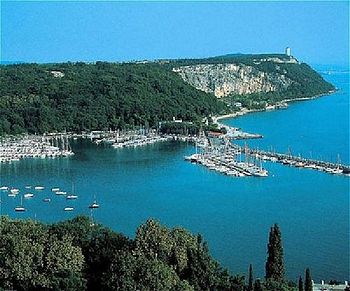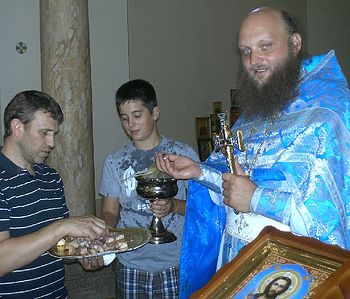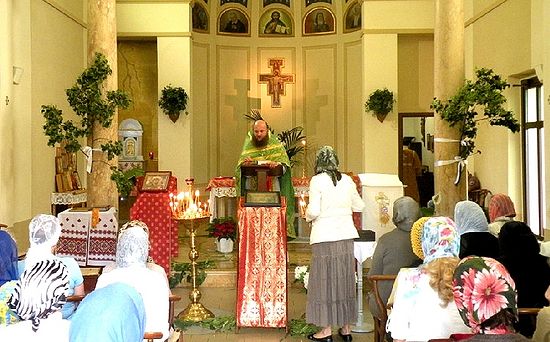 |
Today in Italy there is an Orthodox Church in nearly every large city. The region of Friuli-Venezia Giulia is no exception. It is situated on the northeast part of the country, in the picturesque valley between the Alps and the Adriatic Sea. The Administrative center is the city of Trieste, and includes the cities of Udine, Pordenone, Gorizia, Grado, Monfalcone, Palmanova, and Aquileia. The region is autonomous, and Friulians have their own Friulian language, which comes from seven Rhaeto-Romance languages. In the middle ages many literary works were written in it, but now it is practically dead, although there is a television channel and faculty of Friulian language at the university in Udine. Many here greet each other using instead of the Italian ciao the Friulian manDi, which means “(go) with God.”
Christianity spread in these lands from the Roman city of Aquileia in antiquity. Local tradition has it that the Apostle Mark preached here. In 381, Bishop Valerian of Aquileia conducted an anti-Arian council, at which St. Ambrose of Milan presided. From the sixth century, Aquileia was the seat of what was called a Patriarchate, which held itself independent from Rome for a long time. There even existed a particular “Aquileian rite,” which simulated the services of the Eastern Church in many areas.
After the great schism, the Orthodox presence here was insignificant, but did not entirely disappear. There were Greek communities in the port cities, Serbia was located across the border, and therefore Orthodox services were served from time to time. Two Orthodox churches have remained from former centuries in Trieste: the Greek church of St. Nicholas from the year 1818, and a magnificent Serbian cathedral dedicated to St. Spyridon of Tremithius, built on the site of an ancient church in 1869.
 |
At the turn of the century, Russian compatriot societies began to be organized, such as "Unita," an organization that unites all those who come from the former USSR.
In 2001, through the efforts of some Russian compatriot organizations, the first parish was created—the parish of the Exultation of the Cross, of the diocese of Korsun, Russian Orthodox Church, for the Friulia-Venezia-Giulia region and Slovenia. The city of Udine was chosen to be the center of the parish. Due to the lack of priests, services were conducted irregularly, and in different places. The now reposed archpriest Fr. Boris Razdev, formerly rector of the St. Nicholas Church in Verona, ministered to the community for a long time. Batiushka's spiritual experience and strength of prayer were a great help to the young parish during its period of inception, when all of its ecclesiastical possessions could fit into two suitcases, when the date and venue of the next service was never known for sure, and therefore the faithful were invited for prayer via mobile phone text messages.
In 2010, the first rector of the parish was appointed—Archpriest Nicolai Samborsky, under whose care church life began to normalize, and a place was chosen for regular services. On February 21, 2011, Archpriest Vladimir Melnichuk was appointed rector.
The first thing that one most often notices at an Orthodox service in Italy is the lack of an iconostasis; the services are conducted in Catholic churches, or simply in a room, using a table. Ordinarily the hierarchy of the Roman Catholic Church is well disposed to an Orthodox presence. They kindly offer us their churches for Orthodox services, and gladly permit us to serve molebens at the relics of our common saints. Due to the general apostasy of Western civilization from Christianity even in Catholic Italy, there are many empty churches. They often give them to the Orthodox for use, gratis.
In Udine, services are conducted in a church at the monastery of St. Vincent, at 105 Marangoni Street. Catholics serve there until 9:00 in the morning, and after that, the Orthodox serve. Therefore, the church utensils must be brought out for every service, and removed afterwards. Discussions are taking place with the archbishop of Udine about granting the Orthodox a permanent church, where an iconostasis can be set up. The parish is multi-national. The majority are Ukrainian and Russian, a third are Georgian, and there are also Moldavians and Serbs. Some Catholic Italians come—the husbands of our women. A church is a place where all want to feel at home, to hear the services in the language they are used to praying in. Therefore, besides the main Church Slavonic language, the Moldavian, Ukrainian, Georgian, Serbian, and Italian languages are also heard. The Italian language is becoming the lingua franca—many Georgians and Serbs no longer speak Russian. Fortunately, even amidst such diversity the parish has been able to avoid inter-ethnic conflicts. Clear become the Savior's words, that in Christ there is neither Greek, nor Jew. After services, people remain at the common meal. All share their problems and joys, and learn about new jobs. The parishioners are learning to care about each other, and live as one family.
 |
Everything in the world happens by God's Providence. The Lord turns people's suffering and problems to the good. Finding themselves in a foreign land, people cross the threshold of the church for the first time in order to remain there forever. Having become "strangers and pilgrims," the faithful from Orthodox countries brought the light of Christ's faith to places where it was dying out. And Orthodoxy in Friuli-Venezia-Giulia is not an accidental phenomenon, but an ancient faith, which needs to be shown to the world anew. This our compatriots' purpose in Italy.
